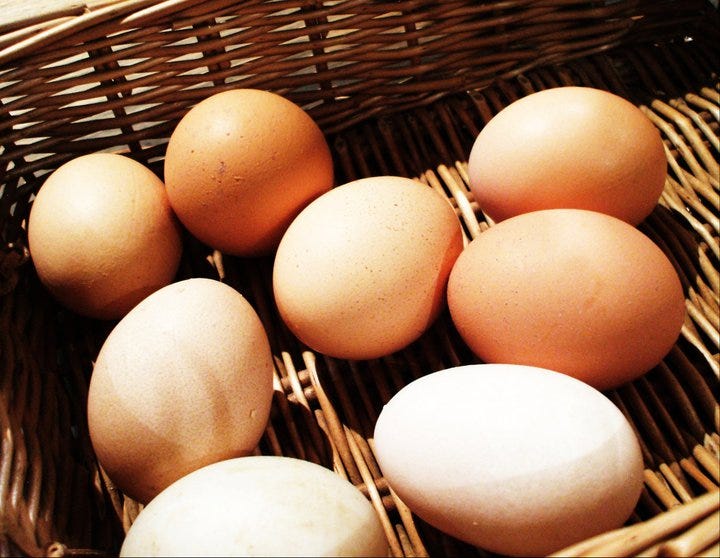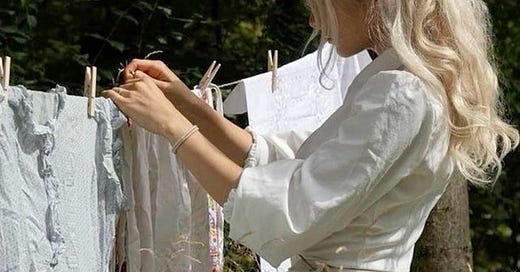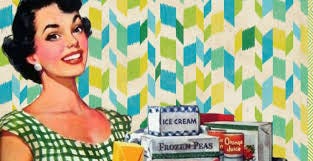A couple of weeks ago published a great piece looking at the tradwife phenomenon. Specifically, asking the question whether the current social media tradwife / feminist divide is just a reappearance of the old SAHM/working mom dichotomy. She examined our tendency to box ourselves and each other into easily labelled opposing categories, complete with their own stereotypes.
Keep reading the whole piece here.
I really enjoyed Amber’s piece and meant to comment on it, but as I tried to get my thoughts organised they outgrew a comment and developed into this post.
I want to pick up on Amber’s observations about our tendency to form opposing camps with strict dividing lines, and draw on my own experience growing up with a mother who, in today’s terms, might be labelled a tradwife.
When I first stumbled across tradwife content on Instagram, I reacted with a mixture of amusement and bemusement. Who were these women twirling in linen dresses in immaculate kitchens? They looked so put together, and their homes seemed so picture perfect.
Why did I react like this? Probably because I grew up with a mom who was a proto-tradwife. This was in the 1990’s, before social media, so there weren’t any influencers advocating for the trad life, but by today’s standards she would be considered a tradwife. She was a SAHM of six kids, most of whom she homebirthed and home educated. We had a couple of acres so we kept chickens and grew our own fruit and veg. Mum baked and cooked everything she could from scratch, and was well known for her ability to turn humble ingredients into delicious dinners.
My parents were also deeply religious, and their faith informed many of their decisions around family life and parenting, something that seems true of many present day tradwives, and their husbands I assume - I do find it strange how there is endless online discussion about tradwives and almost none about their husbands.
Here’s the thing though: my life growing up was only superficially similar to the lifestyle I see portrayed in tradwife social media content. I don’t say this to disparage my parents or the choices they made, as I am very grateful for the upbringing they gave me and my siblings. It was a great way to grow up. But they would be the first to say that our family life looked nothing like most of the '“tradwife” content you see online. Our house was bursting at the seams with my parents, six rapidly growing children, two dogs, and a lost kitten who my brother found in the hedge. Picture perfect it was not, and far from embracing the kind of neutral minimalist aesthetic beloved of Instagram influencers of all stripes, it was a running joke that my mum would never throw anything away “in case we need it one day”. Long story short, homeschooling and homesteading was messy, hard work.
Many of the things my parents did were also born as much of necessity as ideology. Choosing to be open to having a large family was probably the most counter cultural and “ideological” choice they made, and most of the other decisions were downstream of that, and were partly or largely situational. My older brother was born in hospital but it was a very smooth labour and delivery, and my mum happened to have a friend who had a homebirth and loved it, so when my mum was expecting me she decided to try a homebirth. It went so well that she ended up having four more. But she wasn’t a “homebirth is the only way to give birth” kind of woman…it was just something she felt worked for her. Having four kids in five years, with a further two kids a little later, meant that maintaining any kind of “career” was not possible, and my parents made the mutual decision that my mum would stay home and concentrate on raising the kids and supporting my Dad in his role as church pastor. With homeschooling, it was much the same. Initially we were enrolled at the local primary school, but my parents had met an American missionary couple who home educated and it had piqued their interest. When my younger brother started to get badly bullied at school and the head teacher brushed off my parents concerns with a flat “we don’t have bullies in this school, your son must be lying”, they decided to try home education for a year. It went well so they just kept on doing it. Until it didn’t work so well, and my youngest two siblings got enrolled in a local Christian school for the remainder of their education. As a pastor, my Dad would sometimes get asked for advice by families interested in home education, and my parents always stressed that it had pros and cons, and that it wasn’t some kind of magical solution that would work for every family. My mum especially never ever wanted to make other mothers in our church feel pressured to home educate, she was very clear that whilst it worked for us, it wouldn’t necessarily work for everyone, and that it certainly wasn’t some kind of purity test for how seriously you took your role as a mother. We moved around a fair bit but when I was twelve my Dad was called to be a church planter in a rural part of the UK. With six boisterous kids, including three VERY boisterous boys, my parents decided to prioritise buying a property with outside space where their brood could roam freely without (hopefully) causing too much disturbance to the wider community. So they bought a run down house with a couple of acres of land. Trying to raise six kids on a pastors income meant my mum was always looking for a ways to “insource” as much as possible to reduce costs, so she grew veg and kept chickens and made her own bread and jam. It allowed our family to enjoy a really good standard of living relative to the amount of money we had coming in.
What I’m trying to get at, in a long winded way, is that my parents didn’t wake up one morning and decide to embark on “trad life”. They just made a series of decisions that resulted organically in a certain way of life. In the case of homeschooling and homebirth, they were influenced by people they actually knew, but they were still largely pragmatic decisions made in light of the particular concrete circumstances my parents found themselves in. Yes, they were decisions made in light of my parents religious faith, but in a different set of circumstances they would probably have made different decisions. It wasn’t a one size fits all formula for family life, although there were people in our wider Christian circles who did have pretty rigid ideas about how families ought to organise themselves.

Anyway, back to the tradwives of today. I think the term gets thrown around rather loosely, and is used by some to describe anyone who seems to enjoy domesticity and being a SAHM, and by others to refer to people who subscribe to a very rigid set of gender roles that include women never ever working outside the home. For others it seems to be more an aesthetic or a vibe, in a 1950’s domestic goddess kind of way. My brain is too tired today to parse out all the different ways the term gets used and the frequent contradictions between them.
Instead, I want to talk briefly about tradwife influencers, not women who could be called trad, but women who are active on social media promoting tradwife life. First of all, I don’t think that most tradwife influences are nefarious or have overtly sinister motives, but something about them does give me “The Ick”.
On the one hand, I do admire the ingenuity and work ethic of many of these women. Making money on social media is not as easy as it looks, and having to constantly churn out content is a grind. It’s also a way to generate income whilst remaining at home. You could even argue it’s a way of reintegrating paid work and the life of the home in the post-industrial age…something that feels almost…traditional?
I also sympathise with their desire to romanticise domestic life and motherhood. As I wrote in an earlier piece,
But there is something about influencer culture that does make me uncomfortable. It’s not primarily that some of the more extreme tradwife influencers have opinions about women being allowed to vote (I don’t personally follow any of these people but they do exist), but that many of them are mining the intimite daily life of their family for content and clicks. The monetization of family life seems counterintuitive for a movement that proclaims the primacy and importance of the domestic life. Turning the life of the home into an extended selling pitch feels…off. Because that’s what influencers are: salespeople, except the product they’re selling is themselves and, often, their families. I might be massively overthinking this but something about turning your family life into an aspirational product makes me uneasy. It invites the logic of the market into the home.
Social media also has a way of flattening the complexities and nuances of life. Instead we get out of context and filtered snippets of other people’s lives, curated to create the impression the poster wants. It’s not that its necessarily an entirely false picture, more that it is an incomplete one. This is harder to do in real life, as those who know us in person tend to witness the less than perfect parts of our lives and ourselves that we would probably not advertise on social media. So much of the discourse and division that happens amongst women and mothers seems to stem from insecurity around our own choices. Women who work full time feel judged for not being home with their children more, whilst women who are at home with their children feel like they are judged for lacking ambition and autonomy. So we label ourselves and each other and make assumptions about others that are mostly projections of our own perceived failings. Social media exacerbates and amplifies this tendency in alarming ways. We get stuck in our own online echo chambers, further and further removed from each other and from life in the real world.
The reality is that trad life is neither as sinister as some of its detractors make it out to be, nor as idyllic as some of its promoters make it to be. Like most things, the reality is more complex. There is good and bad. It might work for one family and be a disaster for another. Forget about the labels and pursue a life that is consistent with your values and principles. There is beauty in the work of the home, especially when it is done as an act of love for the inhabitants of that home, but that doesn’t mean you have to become a SAHM and home educate your children and keep chickens. I’m not saying don’t do that, but do it because you want to and because you think it’s the right thing for your family, not because an influencer made you feel like you were an inferior mother.
That’s it from me! I’d love to hear your thoughts on the whole tradwife phenomenon, let me know in the comments!
As always, if you enjoyed this piece then please share and subscribe. You can also support my work by donating on Buy Me A Coffee :)






💯, thanks for writing!
I am currently homeschooling and delivered my third at home, and try to cook healthy food. My gardening has yielded one jalapeño and a few grape tomatoes this whole summer. I currently do a little paid work, but it is invisible, so I probably appear pretty tradwifey.
On the rare occasion once someone asks how I got into these things, my honest answer is that when we moved to our city, we providentially landed in a group of friends who were pretty crunchy in a way that was attractive to us – and now we are in the great position of being the crunchiest among our non-crunchy friends and the most mainstream among the crunchy group ☺️ I don’t cloth diaper, but I also don’t use disposable ziploc bags. I homeschool, but I have zero interest in Latin for our curriculum. It makes sense to me and I don’t really care what other people think 🤷🏻♀️
I just want to quote this whole essay! So great, Becca!
"Forget about the labels and pursue a life that is consistent with your values and principles."
Amen!